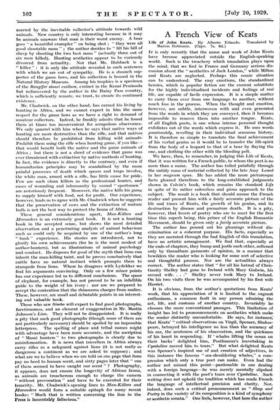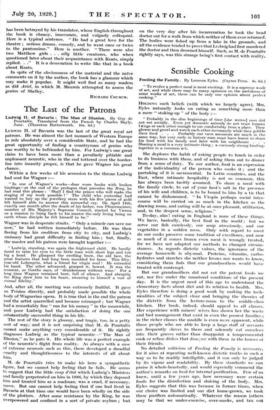A French View of Keats IT is only recently that
the name and work of John Keats have become appreciated outside the English-speaking world. Such is the treachery which translation plays upon the mind, that we find in France and Germany serious dis- cussion about the " aesthetics of Jack London," while Milton and Keats are neglected. Perhaps this comic situation can be understood. The easy emotions, the standardized heroics, which in popular fiction are the current substitute for the highly individualized incidents and feelings of real life, are capable of facile expression. It is a simple matter to carry them over from one language to another, without
much loss in the process. When the thought and emotion, however, are subtle, interwoven with and even generated from the words in which they are conveyed, then it becomes impossible to remove them into another tongue. Keats, of all English poets, is one whose intense personal thought exfoliates out of the words which express it. He uses words passionately, revelling in their individual sensuous history. It is therefore as simple to translate the final achievement of his verbal genius as it would be to transfer the life-spirit from the body of a leopard to that of a bear by flaying the one, and clothing the other with the bleeding pelt.
We have, then, to remember, in judging this Life of Keats, that it was written for a French public, to whom the poet is no more than a name. The author has toiled painfully through the untidy mass of material collected by the late Amy Lowel in her magnum opus. He has added the more picturesque facts gleaned therefrom to the long-established judgments shown in Colvin's book, which remains the standard Life in spite of its rather colourless and pious approach to the subject. The result is a book that should amuse the French reader and present him with a fairly accurate picture .of the life and times of Keats, the growth of his genius, and its destruction by disease and premature death. It is a pity, however, that lovers of poetry who are to meet for the first time this superb being, this prince of the English Romantic Movement, should be given only a fairly accurate pictUre.
The author has poured out his gleanings without dis- crimination or a coherent purpose. His facts, especially as they are narrated through the bad English of this translation, have no artistic arrangement. We find that, especially at the ends of chapters, they bump and jostle each other, softened only by threadbare garments of opinion, in a manner that bewilders the reader who is looking for some sort of selective and thoughtful process. Nor are the actualities always correct. The author states that " for all his hatred of Chris- tianity Shelley had gone to Ireland with Mary Godwin, his second wife. . . ." Shelley never took Mary to Ireland. On his two visits there he was accompanied by his first wife Harriet.
It is obvious, from the author's quotations from Keats' work, that his appreciation of it is limited to the .vaguest enthusiasm, a common fault in any person admiring the
art, life, and customs of another country. Invariably he chooses the more conventional passages. This limitation, of insight has led to pronouncements on aesthetics which make• the reader distinctly uncomfortable. He says, for, instance; that Keats"' critical observations on Virgil, Spenser, Shakes- peare, betrayed his intelligence no less than the accuracy of his ear,. the acuteness of his observation, and the quickness of his heart in responding. If whales lifting the ocean on their backs ' delighted him, Posthumus's leavetaking in Cymbeline moved him to tears." But what delighted Keats was Spenser's inspired use of and creation of adjectives, in this instance the famous " sea-shouldering whales," a com- pression which only a true poet can make. Even had the author not missed this point—pardonable in one dealing with a foreign language—he was merely mentally slipshod in connecting it with the poet's tears over Cymbeline. Such writing does not uphold the tradition which has made French the language of intellectual precision and clarity. Nor, indeed, does such a critical pronouncement as " Sleep and Poetry in the variety of its, composition is a kind of symphony or aesthetic Sonata." One feels, however, that here the author
has been betrayed by his translator, whose English throughout the book is clumsy, inaccurate, and vulgarly colloquial. Here is a typical sentence. " He had a great love for the theatre ; serious drama, comedy, and he went once or twice to the pantomime." Here is another. " There were also two Matthew girls . . . silly little creatures, who when questioned later about their acquaintance with Keats, simply replied. . ." It is a desecration to write like that in a book about Keats.
In spite of the obviousness of the material and the naive comments on it by the author, the book has a glamour which may make it popular. It might well find as many readers as did Ariel, in which M. Maurois attempted to assess the genius of Shelley.
RICHARD CHURCH.

















































 Previous page
Previous page